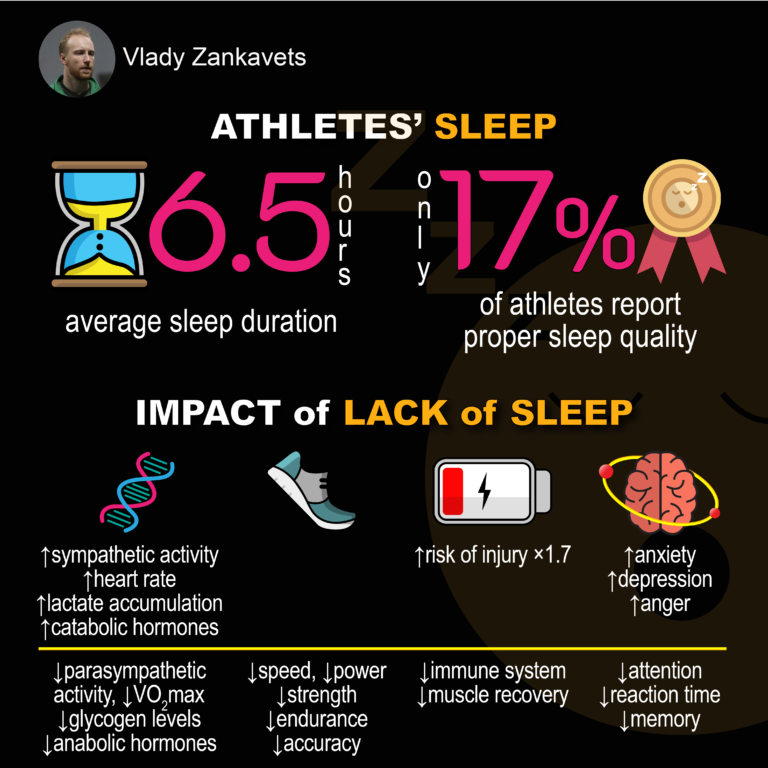
Sleep is the most powerful recovery tool. It promotes a restorative effect on the body, but to do so it must be of adequate duration and quality. Unfortunately, most of the athletes lack both parameters. Average sleep duration of modern athletes is 6.5 hours per night [1], and 83% of Olympians indicate poor sleep quality [2]. The most common disorders that negatively affect athletes’ sleep quality are:
- Insomnia: 26% of athletes. Factors that predispose athletes to insomnia are:
Personal traits as a focus on success [3];
Pre-competition anxiety [4];
High frequency, intensity, and volume of training sessions [1];
Travel and associated jetlag [5].
- Obstructive Sleep Apnea: 10% of hockey players [6]. Large body mass and neck circumference, which are common for strength, power, and contact sports, are the main traits that cause obstructive sleep apnea [7].
- Restless Legs Syndrome: 5% of hockey players [6].

Impact of Lack of Sleep
Lack of sleep duration or quality negatively affects not only the health of athletes but also their athletic performance.
- Physiology
↑ Sympathetic nervous system activity [13], heart rate [8], respiratory frequency [8], lactate accumulation [8], catabolic hormone level [9, 18].
↓Parasympathetic nervous system activity [13], anabolic hormone level [18], glycogen level [10], VO2max [8],
- Performance Deterioration
↓ Power [11], speed [10], strength [10], endurance [20], accuracy [12].
- Recovery Inhibition
Sleep deprivation negatively affects the immune system and hinders muscle recovery from training [15].
- Increase of Injury Risk
Athletes sleeping less than 8 hours per night are 1.7 times more likely to get injured [14].
- Cognitive Function Impairment
↑ Anxiety, depression, anger [19]
↓ Attention, reaction time [16], memory [17]
Thank you!
References:
- Sargent C, et al. The impact of training schedules on the sleep and fatigue of elite athletes
- Drew MK, et al. A multifactorial evaluation of illness risk factors in athletes preparing for the Summer Olympic Games
- Harvey CJ, Gehrman P, & Espie CA. Who is predisposed to insomnia: a review of familial aggregation, stress-reactivity, personality and coping style.
- Erlacher D, et al. Sleep habits in German athletes before important competitions or games.
- Fowler P, et al . Effects of northbound long-haul international air travel on sleep quantity and subjective jet lag and wellness in professional Australian soccer players.
- Tuomilehto H, et al. Sleep of professional athletes: underexploited potential to improve health and performance.
- Swinbourne R, et al. Prevalence of poor sleep quality, sleepiness and obstructive sleep apnea risk factors in athletes.
- Mougin F, et al. Effects of sleep disturbances on subsequent physical performance.
- Omisade A, Buxton OM, & Rusak B. Impact of acute sleep restriction on cortisol and leptin levels in young women.
- Skein M, et al. Intermittent-sprint performance and muscle glycogen after 30 h of sleep deprivation.
- Taheri M, & Arabameri E. The effect of sleep deprivation on choice reaction time and anaerobic power of college student athletes.
- Reyner LA, & Horne JA. Sleep restriction and serving accuracy in performance tennis players, and effects of caffeine.
- Zhong X, et al. Increased sympathetic and decreased parasympathetic cardiovascular modulation in normal humans with acute sleep deprivation.
- Jones C, et al. Pre-season injury and illness associations with perceptual wellness, neuromuscular fatigue, sleep and training load in elite rugby union.
- Haack M, Sanchez E, & Mullington JM. Elevated inflammatory markers in response to prolonged sleep restriction are associated with increased pain experience in healthy volunteers.
- Dinges DF, et al. Cumulative sleepiness, mood disturbance, and psychomotor vigilance performance decrements during a week of sleep restricted to 4–5 hours per night.
- Curcio G, Ferrara M, & De Gennaro L. Sleep loss, learning capacity and academic performance.
- Dattilo M, et al. Sleep and muscle recovery: Endocrinological and molecular basis for a new and promising hypothesis.
- Sinnerton S, Reilly T. Effects of sleep loss and time of day in swimmers.
- Oliver SJ, et al. One night of sleep deprivation decreases treadmill endurance performance.